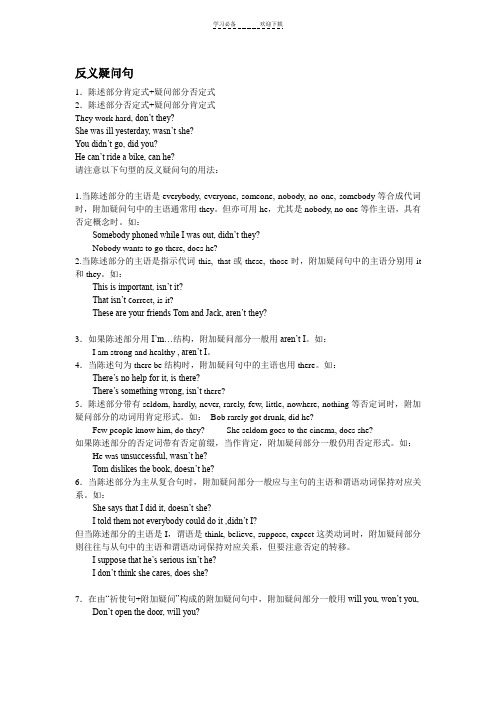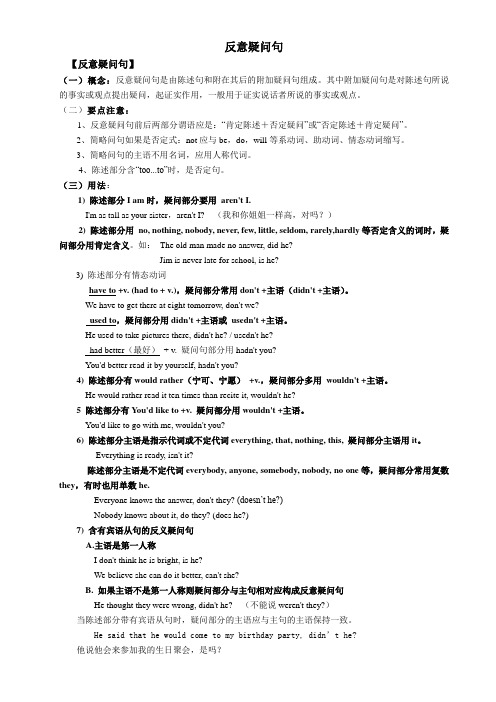反义疑问句的用法归纳及模拟题
反义疑问句详解及练习和答案

反义疑问句1.陈述部分肯定式+疑问部分否定式2.陈述部分否定式+疑问部分肯定式They work hard, don’t they?She was ill yesterday, wasn’t she?You didn’t go, did you?He can’t ride a bike, can he?请注意以下句型的反义疑问句的用法:1.当陈述部分的主语是everybody, everyone, someone, nobody, no one, somebody等合成代词时,附加疑问句中的主语通常用they。
但亦可用he,尤其是nobody, no one等作主语,具有否定概念时。
如:Somebody phoned while I was out, didn’t they?Nobody wants to go there, does he?2.当陈述部分的主语是指示代词this, that或these, those时,附加疑问句中的主语分别用it 和they。
如:This is important, isn’t it?That isn’t c orrect, is it?These are your friends Tom and Jack, aren’t they?3.如果陈述部分用I’m…结构,附加疑问部分一般用aren’t I。
如:I am strong and healthy , aren’t I。
4.当陈述句为there be结构时,附加疑问句中的主语也用there。
如:There’s no help for it, is there?There’s something wrong, isn’t there?5.陈述部分带有seldom, hardly, never, rarely, few, little, nowhere, nothing等否定词时,附加疑问部分的动词用肯定形式。
反义疑问句句知识点+习题

反义疑问句一、学习反意疑问句,特别要注意的问题1)陈述部分的主语是this, that时,疑问部分的主语多用it;陈述部分的主语是these, those时,疑问部分的主语多用they如:This is a dictionary, isn’t it?Those are shelves, aren’t they?2)陈述句如果是there be结构时,疑问句部分仍用there。
如:There once was a man named Saint Nicholas, wasn’t there?3)在英语口语中,“I am +表语结构”,后面的反意疑问句多用aren’t I来体现。
如:I am very interested in learning English, aren’t I?4)陈述句的主语是动词不定式,动词的-ing形式或从句时,疑问部分的主语多用it来体现。
如:Taking care of our environment is very important, isn’t it?What he said is right, isn’t it?5)陈述句中含有not, no, hardly, neither, never, few, little, too …to等否定词或具有否定意义的词时,疑问部分常用肯定形式。
如:Few people knew the news, did they?Tom has never been to England , has he?但陈述句中如果带有否定意义的前缀和后缀的单词时,整个句子仍视为肯定句,反意疑问部分多用否定形式。
如:She is unhappy, isn’t she?6)陈述句的主语是nobody, no one, everyone, somebody等不定代词时,反意疑问部分的主语多用they (当强调全体时)或he(当强调个体时)。
如果陈述句的主语是something, nothing, anything, everything 等不定代词时,反意疑问部分的主语多用it。
反义疑问句的用法归纳及回答举例

反义疑问句的用法归纳及回答举例
1. 哎呀呀,反义疑问句就是在陈述句后面加上一个简短问句呀!比如“你喜欢看书,不是吗?”,这里就是先陈述“你喜欢看书”,然后问“不是吗”。
2. 咱要注意哦,如果前面陈述句是肯定的,后面的反义疑问句就要用否定形式呢。
就像“他很聪明,不是吗?”。
3. 反过来,如果前面是否定陈述句,那后面的反义疑问句就得是肯定的啦!比如“她今天没来,对吧?”。
4. 回答的时候可别糊涂呀!要是同意就说“是呀”或“对呀”,不同意就直接说“不是”。
就好像人家问“今天天气不错,不是吗?”,觉得对就说“是呀”。
5. 有时还会遇到特殊情况呢,像“Let's go shopping,shall we?”这时候就得用“shall we”呀。
6. 还有那种祈使句的反义疑问句呢,“别跑太快,好吗?”就是一种呀。
7. 哎呀,这反义疑问句用法不复杂吧,一学就会啦!就像学骑自行车,掌握了技巧就没问题啦!
8. 记住这些要点,以后再遇到反义疑问句就不怕啦!反义疑问句其实挺好玩的呀,能让我们的交流更有趣不是吗?我觉得掌握反义疑问句真的很有用,能让我们的表达更丰富呢。
反义疑问句的用法归纳及习题

反义疑问句的用法归纳及习题反义疑问句是英语语法中的常用句型之一,它由一个肯定或否定的陈述句和一个所加的疑问句构成。
通过反义疑问句的使用,我们可以在表达思想观点时增强语气,提出问题的同时向对方确认自己的观点。
本文将介绍反义疑问句的用法,并提供相应的习题供读者进行练习。
一、反义疑问句的构成反义疑问句由两个部分组成:一个陈述句和一个疑问句。
陈述句通常是一个完整的句子,而疑问句则是一个简化的疑问句。
1. 如果陈述句是肯定句,则疑问句部分用否定形式;例如:- They are from China, aren't they?- You can swim, can't you?2. 如果陈述句是否定句,则疑问句部分用肯定形式;例如:- He doesn't like coffee, does he?- They haven't arrived yet, have they?二、反义疑问句的用法1. 确认对方的观点或陈述:当说话人对对方的陈述持怀疑态度时,可以使用反义疑问句来进行确认。
例如:- You haven't seen the movie, have you?- You don't like ice cream, do you?2. 请求对方的帮助或征求对方的意见:当说话人需要对方给予回应或意见时,可以使用反义疑问句来婉转地提出请求。
例如:- It's a beautiful day, isn't it? (期待对方赞同这个说法)- This problem is difficult, isn't it? (希望对方给予帮助或建议)3. 表达自己的观点或感受:反义疑问句也可以用来表达自己的观点或感受,并期待对方与自己保持一致或不一致。
例如:- She is a talented singer, isn't she?- You're not feeling well, are you?三、习题练习以下是一些习题,供读者练习反义疑问句的用法。
反义疑问句详细讲解及习题及答案

反义疑问句一.句型解释反义疑问句(The Disjunctive Question):即附加疑问句。
它表示提问人的看法,没有把握,需要对方证实。
反义疑问句由两部分组成:前一部分是一个陈述句,后一部分是一个简短的疑问句,两部分的人称时态应保持一致。
1.陈述部分肯定式+疑问部分否定式2.陈述部分否定式+疑问部分肯定式She was ill yesterday, wasn’t she?You didn’t go, did you?二.特殊的句型1.祈使句。
祈使句后一般加上will you或won't you构成反意疑问句,用will you 多表示“请求”,用won't you 多表示提醒对方注意。
例如:Let引导的祈使句有两种情况:1) Let's...,后的反意疑问句用shall we或shan't we。
例如:Let's go home, shall we/ shan't we? 回家吧,好吗?2)Let us/me...后的反意疑问句用will you或won't you。
例如:Let me have a try, will you/won't you?3)祈使句都用will you 或won’t you2.当陈述部分含I think (believe, suppose...)that... 结构时,其反意疑问句须与从句的主、谓语保持一致,注意主句的主语必须是第一人称。
例如:I don't think he will come, will he?若是非第一人称,则与主句的主语相一致He thinks that she will come, doesn’t he?反意疑问句的陈述部分为I(We) don’t think(believe, suppose, consider)+ that从句时,从句为否定意义,问句部分的动词和主语仍与that从句保持一致且用肯定式。
(完整版)反义疑问句的用法归纳及习题

反意疑问句【反意疑问句】(一)概念:反意疑问句是由陈述句和附在其后的附加疑问句组成。
其中附加疑问句是对陈述句所说的事实或观点提出疑问,起证实作用,一般用于证实说话者所说的事实或观点。
(二)要点注意:1、反意疑问句前后两部分谓语应是:“肯定陈述+否定疑问”或“否定陈述+肯定疑问”。
2、简略问句如果是否定式:not应与be,do,will等系动词、助动词、情态动词缩写。
3、简略问句的主语不用名词,应用人称代词。
4、陈述部分含“too...to”时,是否定句。
(三)用法:1) 陈述部分I am时,疑问部分要用aren't I.I'm as tall as your sister,aren't I?(我和你姐姐一样高,对吗?)2) 陈述部分用no, nothing, nobody, never, few, little, seldom, rarely,hardly等否定含义的词时,疑问部分用肯定含义。
如:The old man made no answer, did he?Jim is never late for school, is he?3) 陈述部分有情态动词have to +v. (had to + v.),疑问部分常用don't +主语(didn't +主语)。
We have to get there at eight tomorrow, don't we?used to,疑问部分用didn't +主语或usedn't +主语。
He used to take pictures there, didn't he? / usedn't he?had better(最好)+ v. 疑问句部分用hadn't you?You'd better read it by yourself, hadn't you?4) 陈述部分有would rather(宁可、宁愿)+v.,疑问部分多用wouldn't +主语。
反意疑问句的用法归纳及回答举例

反意疑问句的用法归纳及回答举例1. 反意疑问句概述嘿,大家好!今天咱们来聊聊一种在英语里特别有趣的句型——反意疑问句。
听起来挺拗口的,但别担心,我会用简单易懂的方式带你搞定它。
反意疑问句,顾名思义,就是在一句话末尾加上一个小问题,用来确认之前说的内容。
这种句型在日常对话中非常常见,让我们来看看它是怎么回事。
比如说,你告诉朋友:“今天天气真好。
”接下来,你可能会加一句:“对吧?”这就是反意疑问句。
这个小句子“对吧”就是用来确认你说的事情是否正确。
用这种句子就像是在和人聊家常一样自然,也能让对方参与到对话中来。
2. 反意疑问句的构成说到反意疑问句的构成,其实也没那么复杂。
它主要有两部分:前面的陈述句和后面的疑问句。
简单来说,你先说一个陈述句,然后用相反的疑问句来进行确认。
这个疑问句的部分就像是小小的“审问官”,来确认你说的话是否正确。
2.1 主语和谓语的匹配首先,反意疑问句的主语和谓语要和前面的陈述句保持一致。
比如,你说:“她已经完成了工作。
”为了确认这点,你会问:“她不是吗?”这里,“她不是吗”就是反意疑问句,主语“她”与前面的陈述句一致,谓语“不是”也是相对的。
2.2 确认和否定的转换其次,反意疑问句的一个关键点是,前面的陈述句是肯定的,后面的疑问句就用否定;反之亦然。
例如,“你喜欢这部电影,对吧?”如果前面的陈述句是负面的,比如“他不喜欢这件事”,那么反意疑问句就会是“他是吗?”这样,前后句子的情感方向就相反了。
3. 反意疑问句的回答方式说到反意疑问句的回答,那也是有讲究的哦。
通常,回答的时候要看你是否同意前面的陈述句。
如果同意,就用肯定的回答;如果不同意,就用否定的回答。
举个例子,你的朋友说:“这家餐厅的菜很好吃,对吧?”如果你同意,可以回答:“是的,确实很好吃。
”如果你不同意,可能就会说:“其实我觉得一般般。
”3.1 肯定回答当你同意对方的陈述时,直接用“Yes”或者“确实”来回应。
例如:“这部电影很有趣,不是吗?”你可以说:“是的,我也这么觉得!”这样你就和对方达成了共识。
反义疑问句(含解析、例句及详尽用法)

反义疑问句一、祈使句的反义疑问句1、肯定祈使句Will you/won’t you2、否定祈使句Will you3、Let的祈使句Let us ...,will you(此处Let us 表示“允许我们...”)Let’s...,shall we (此处Let’s表示“让我们...吧”)Let + 第三人称...,will you二、Must的反义疑问句1、表示“必须” musn’t /needn’tEg. You must go now, needn’t you2、表示“不准”Eg. You musn’t smoke here, must/may you3、表示推测,肯定。
(I’m sure + 从句)Eg. You must be hungry now, aren’t youI’m sure you are hungry now, aren’t youShe must have heard about that, hasn’t sheI’m sure you have heard about that, haven’t youYou must have watched that movie last night, didn’t you(last nigh 为具体时间点,所以用一般过去式)三、主语(反义疑问句)+从句主句:I(don’t)think/believe/consider/suppose 或I’m afraid/sure...后跟从句时,可将从句部分进行反义疑问Eg. I don’t think he will win, will heI think he will win, won’t heShe thinks he will win, doesn’t she(当主句主语不是I时不适用于该用法,此句中的翻译疑问针对的是主句而非从句)四、当句中包含有表示否定意义的副词或不定代词时,反义疑问句用肯定形式Eg. Nothing happened to him, did itIt is unfair, isn’t itHe dislikes watching TV, doesn’t he(该句中含否定意义的是动词而非副词或不定代词,因此不适用于该用法,反义疑问句仍然使用否定形式)五、反义疑问句的回答反义疑问句的回答针对被提问部分的谓语动词,且与回答句前部分的Yes 和No保持一致Eg. A: You haven’t lost the ticket, have youB: D I know it’s hard to get another one at this moment.A. Yes, I haven’tB. No, I haveC. I hope soD. I’m afraid not六、陈述部分的主语与反义疑问句主语保持一致的情况1、OneEg. One can’t be too careful when driving a car, can one/he一个人在开车的时候再怎么小心也不为过。
- 1、下载文档前请自行甄别文档内容的完整性,平台不提供额外的编辑、内容补充、找答案等附加服务。
- 2、"仅部分预览"的文档,不可在线预览部分如存在完整性等问题,可反馈申请退款(可完整预览的文档不适用该条件!)。
- 3、如文档侵犯您的权益,请联系客服反馈,我们会尽快为您处理(人工客服工作时间:9:00-18:30)。
反意疑问句【反意疑问句】(一)概念:反意疑问句是由陈述句和附在其后的附加疑问句组成。
其中附加疑问句是对陈述句所说的事实或观点提出疑问,起证实作用,一般用于证实说话者所说的事实或观点。
(二)要点注意:1、反意疑问句前后两部分谓语应是:“肯定陈述+否定疑问”或“否定陈述+肯定疑问”。
2、简略问句如果是否定式:not应与be,do,will等系动词、助动词、情态动词缩写。
3、简略问句的主语不用名词,应用人称代词。
4、陈述部分含“too...to”时,是否定句。
(三)用法:1) 陈述部分I am时,疑问部分要用aren't I.I'm as tall as your sister,aren't I?(我和你姐姐一样高,对吗?)2) 陈述部分用no, nothing, nobody, never, few, little, seldom, rarely,hardly等否定含义的词时,疑问部分用肯定含义。
如:The old man made no answer, did he?Jim is never late for school, is he?3) 陈述部分有情态动词have to +v. (had to + v.),疑问部分常用don't +主语(didn't +主语)。
We have to get there at eight tomorrow, don't we?used to,疑问部分用didn't +主语或usedn't +主语。
He used to take pictures there, didn't he? / usedn't he?had better(最好)+ v. 疑问句部分用hadn't you?You'd better read it by yourself, hadn't you?4) 陈述部分有would rather(宁可、宁愿)+v.,疑问部分多用wouldn't +主语。
He would rather read it ten times than recite it, wouldn't he?5 陈述部分有You'd like to +v. 疑问部分用wouldn't +主语。
You'd like to go with me, wouldn't you?6) 陈述部分主语是指示代词或不定代词everything, that, nothing, this, 疑问部分主语用it。
Everything is ready, isn't it?陈述部分主语是不定代词everybody, anyone, somebody, nobody, no one等,疑问部分常用复数they,有时也用单数he.Everyone knows the answer, don't they? (doesn’t he?)Nobody knows about it, do they? (does he?)7) 含有宾语从句的反义疑问句A.主语是第一人称I don't think he is bright, is he?We believe she can do it better, can't she?B. 如果主语不是第一人称则疑问部分与主句相对应构成反意疑问句He thought they were wrong, didn't he? (不能说weren't they?)当陈述部分带有宾语从句时,疑问部分的主语应与主句的主语保持一致。
He said that he would come to my birthday party, didn’t he?他说他会来参加我的生日聚会,是吗?但当主句是:I think, I believe, I suppose, I except, I imagine等结构时,疑问部分的主语和谓语动词应与宾语从句的主语和谓语保持一致。
I don’t believe he will succeed, will he? 我不相信他会成功,是吗?He doesn’t believe he will succeed, does he? 他不相信他会成功,是吗?8) 省去主语的祈使句的反意疑问句,Don't do that again, will you?Go with me, will you / won't you?否定祈使句+ will you?肯定祈使句+ will / won’t you?Let's 开头的祈使句,后用shall we(或用shan't we) ?而Let us 开头的祈使句,后用will you(或won't you)?Let's go and listen to the music, shall we(或用shan't we)?Let us wait for you in the reading-room, will you (或won't you)?9) 陈述部分是"there be"结构的,疑问部分用there。
There is something wrong with your watch, isn't there?There will not be any trouble, will there?11)如果陈述句部分的谓语含有带否定前缀dis-, un-, im-或否定后缀-less的词(dislike,discourage,be unfair/ untrue/ unable, etc.),仍按肯定句处理,其反问部分一般用否定式。
It’s unfair, isn’t it? 不公平,是吗?You dislike it, don’t you? 你不喜欢它,是吗?The patient is unable to move round, isn’t he? 这个病人不能到处走,是吗?10、陈述部分含有must的反义疑问句:当must作“必须”讲时,其翻译疑问部分用needn’t。
当含有mustn’t(不允许,禁止)时,其反意疑问部分用must/ may。
You must go now, needn’t you? 你必须走,是吗?You mustn’t smoke here, must/may you? 你不可以在这里吸烟,对吗?11、感叹句中,疑问部分用be +主语。
What beautiful flowers, aren’t they? 多漂亮的花呀,不是吗?16、带情态动词dare或need的反义疑问句,疑问部分常用 need (dare ) +主语。
We need not do it again, need we? 我们不需要重做,是吗?He dare not say so, dare he? 他不敢如此说,是吗?当dare, need 为实义动词时,疑问部分用助动词do + 主语。
例如:She doesn’t dare to go home alone, does she? 她不敢独自回家,是吗?四、反义疑问句的回答:1、一个句子前后保持一致,要么肯定到底,要么否定到底,不能出现Yes, I don’t和No, I do的形式。
You don’t go to school on Sunday, do you? 肯定回答:Yes, I do.否定回答:No, I don’t.2、反义疑问句的回答是根据实际情况来回答的。
不用看汉语如何翻译,只看所提到的事情是否发生。
如果发生了,就用肯定回答,否则用否定回答。
()1. Don’t forget to give Polly some food and change her water, _______?A. shall weB. will youC. won’t youD. do you()2. There is little juice in the glass, _________?A. is thereB. isn’t thereC. is it()3. ---He’s seldom late for school, ___________?---No. He is used to going to school early.A. isn’t heB. has heC. hasn’t heD. is he()4.---This bus is always late, _________? ---Sure, it is.A. is not itB. isn’t itC. isn’t the busD. doesn’t it()5.---You’re new here, ________?----Yes, I’m from Dujiangyan. I came here last week.A. do youB. don’t youC. are youD. aren’t you()6. You used to be outgoing, ?A. do youB. d on’t youC. didn’t youD. did you()7. He has never watched such an important match , _____ he?A. hasn'tB. hasC. isD. isn't()8.They have to work at once,______ they?A. haveB. haven'tC. doD. don't()9. She often feels tired,______ she?A. doesn'tB. doesC. isD. isn't()10. Let's take a short rest, ______?A. do weB. aren't weC. will youD. shall we()11. Hundreds of people lost their lives in the accident,_______ they?A. don'tB. didn'tC. doD. did()12. ---Lily didn't come to school, did she?---____. She was ill in bed.A.No,she didB. Yes, she did.C. No,she didn't.D. Yes,she didn't()13.---She isn't a teacher, is she?---_____. She works in a hospital.A.No,she isB. Yes, she is.C. No,she isn't.D. Yes,she isn't()14.Lily looks like Lucy,_______?A. is LilyB. isn't sheC. does LillyD. doesn't she()15.Tom often has lunch at school,_____?A. doesn't TomB. doesn't heC. does TomD. doesn't he()1.He hardly hurt himself in the accident___________?A. doesn’t heB. didn’t heC. did heD. does he()2. Let’s search the Internet for some information about famous people,______?A. will youB. won’t youC. shall we()3.Eric’s never seen a three-D movie at the cinema,_______?A.hasn’t he B.has he C.isn’t he D.is he()4.---He didn’t go to the lecture this morning, did he?----______. Though he was not feeling very well.A. No, he didn’t.B. Yes, he did.C. No, he did.D. Yes, he didn’t.()5.—He’s already back to Australia, _________?— _________. He is on a visit to Shanghai.A. isn’t he。
